Scaling AI: practical insights from AI leaders
A proprietary Kore.ai report capturing the beliefs, sentiments, and priorities of today’s enterprise AI decision-makers
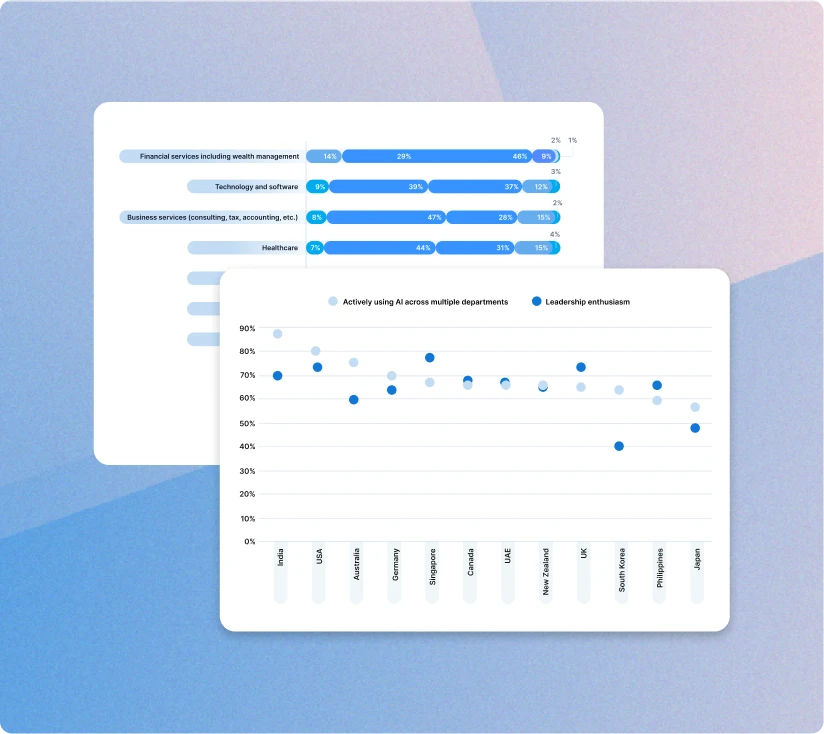

Foreword
We’re entering a new era where AI is no longer a question of if, but how fast and how far.
In the past year, AI has crossed a threshold. What was once experimental is now operational. It’s powering real impact—from transforming service delivery and automating workplace tasks to accelerating decisions and shaping new business models.
At Kore.ai, we believe this is more than a tech shift—it’s a mindset shift. It’s about reimagining how work gets done, how people interact with systems, and how businesses scale intelligence across every function. But transformation doesn’t happen in isolation. It requires insights from those on the front lines: the leaders building, implementing, and navigating AI across the enterprise.
This is why we commissioned global research, capturing the voices of over 1,000 senior leaders across industries and regions. What we found is clear: organizations aren’t just investing in AI—they’re re-architecting around it. Yet, challenges remain: data quality, scaling barriers, talent gaps, and the cost of deploying LLMs at scale.
This report cuts through the noise and delivers practical, real-world insights. From build vs. buy decisions and use cases that work to talent strategies and vendor selection, it offers a map of where AI is today—and where it needs to go next.
Whether you’re an AI optimist, a cautious adopter, or somewhere in between, we are confident this research will offer you the clarity and confidence to move forward with purpose.
Let’s reimagine the business with AI. Together.
~ Raj Koneru
Founder and CEO, Kore.ai
In this paper, you’ll discover:
- Where and how AI is being used across departments
- The top use cases in different industries delivering measurable impact
- The AI technologies enterprises are adopting—and why
- How leaders are choosing between building vs. buying AI tools and solutions
- What matters most when selecting AI vendors or platforms
- The biggest AI challenges companies face today—and what they’ve learned
- How talent and skills are evolving to keep pace
- Where AI budgets are headed next
- What’s changing in AI strategies for 2025 and beyond
Key findings
- AI is making inroads in every function, but the readiness lags
AI is now embedded across the enterprise, with 71% of companies actively using or piloting AI across departments like customer service, IT, HR, finance, operations, and marketing. Yet, only 30% report being fully prepared, pointing to critical gaps in data, infrastructure, and talent. - AI is used in workplace, business process automation & orchestration, and for customer service
Process orchestration is the top use case, accounting for 44%. AI in the workplace follows at 31%, with enterprises deploying it to enhance employee productivity. AI for customer service claims 24% and is being adopted to deliver better and faster support. - Buy-over-build is the dominant strategy
The vast majority—72%—prefer purchasing and customizing AI solutions over building them internally. Trust and reputation lead vendor evaluations, with model output quality, efficiency, and integration cited as top decision factors. - Initial success is high, but scaling is tough
The study revealed that 93% consider their initial AI implementations (pilots) successful, however, scaling is constrained due to concerns over data privacy and regulatory compliance, LLM costs, and AI talent shortage. - The human-AI collaboration is the next frontier
AI success is increasingly tied to AI expertise and employees’ ability to collaborate with AI. Most companies plan to upskill or hire for data analysis and AI interaction roles, acknowledging that technical infrastructure alone won’t drive future gains.
In short, the use of AI in the enterprise has entered a new phase—moving from experimentation to operationalization, but realizing its full value requires a renewed focus on readiness, scalable infrastructure, responsible governance, and a workforce empowered to work alongside intelligent systems.
Key definitions for clarity
AI Platform: A foundational infrastructure that provides the core capabilities needed to build, deploy, manage, and scale AI models, agents, and applications. It includes tools for data integration, model training, orchestration, monitoring, and governance — often with support for multimodal input, agentic workflows, and APIs for integration. Think of it as the operating system for enterprise AI.
Examples: Kore.ai Agent Platform, Google Vertex AI, Microsoft Azure AI, AWS Bedrock.
AI Solutions: Pre-built or customizable end-to-end offerings that solve specific business problems using AI. These may include multiple components like bots, workflows, models, UI elements, and integrations, and are often built on top of a platform. Think of them as ready-to-use AI toolkits for functional or industry-specific use cases.
Examples: AI-powered customer service automation, HR onboarding assistants, claims processing workflows, or IT support solutions.
AI Apps: Lightweight, often standalone user-facing applications that use AI to perform a focused task or interaction. These can be web, mobile, or chat-based apps that leverage AI for functionality, often built from solutions or directly on the platform. Think of them as the end-user experience layer of AI.
Examples: A voice assistant app for banking, an AI assistant for tech support, and a personalized shopping assistant.
AI is actively used across multiple departments
The use of AI is widespread within organizations and is now considered a core driver for digital transformation. While IT support and customer service departments continue to be the top adopters of AI, the marketing department is in the top three in AI adoption. Other departments such as product development, HR, operations, finance, and engineering have also seen good adoption of AI, while administration, procurement, legal, or sales have moderate adoption or have experimented with AI. Overall, AI is actively used or experimented with across the organization.
71% of enterprise leaders surveyed report active use of AI across multiple departments in their organization.
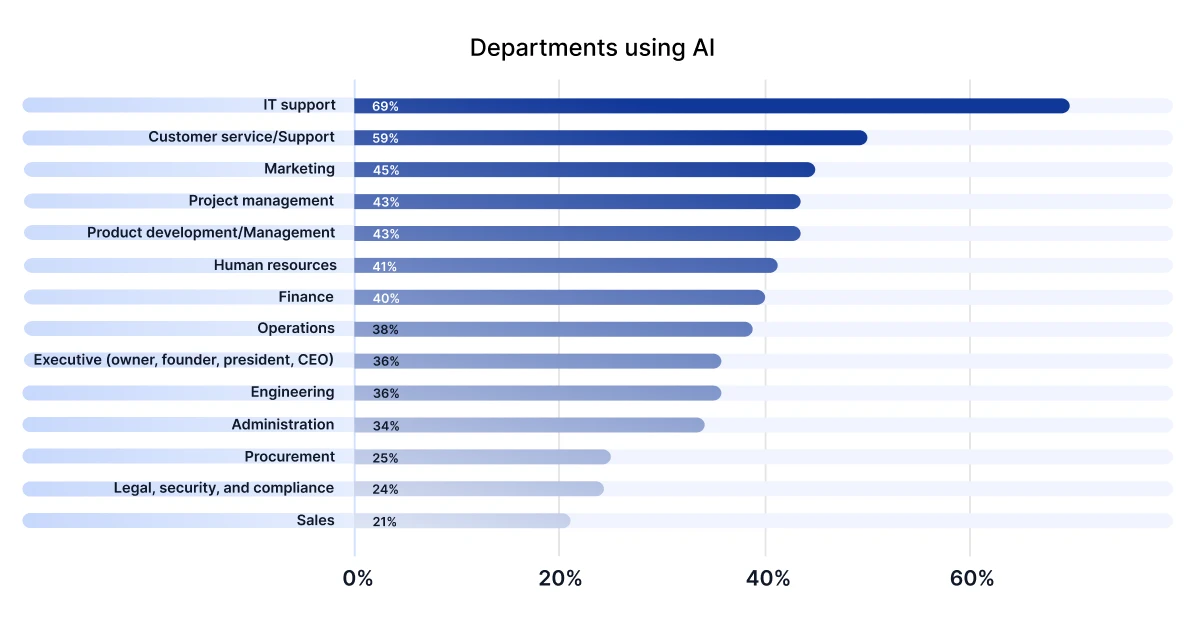
Current AI usage

This expansion marks a pivotal moment: Many functions within organizations are trying to reimagine their operations with AI. This indeed is a positive sign for AI adoption.
The United States, Germany, Australia, and India are leading the charge, both in departmental usage and executive advocacy. In contrast, South Korea, Japan, and the Philippines trail behind, reflecting a slightly lower level of enthusiasm in the leadership. These regional differences indicate the importance of executive enthusiasm in accelerating adoption.
AI usage & AI leadership enthusiasm by country
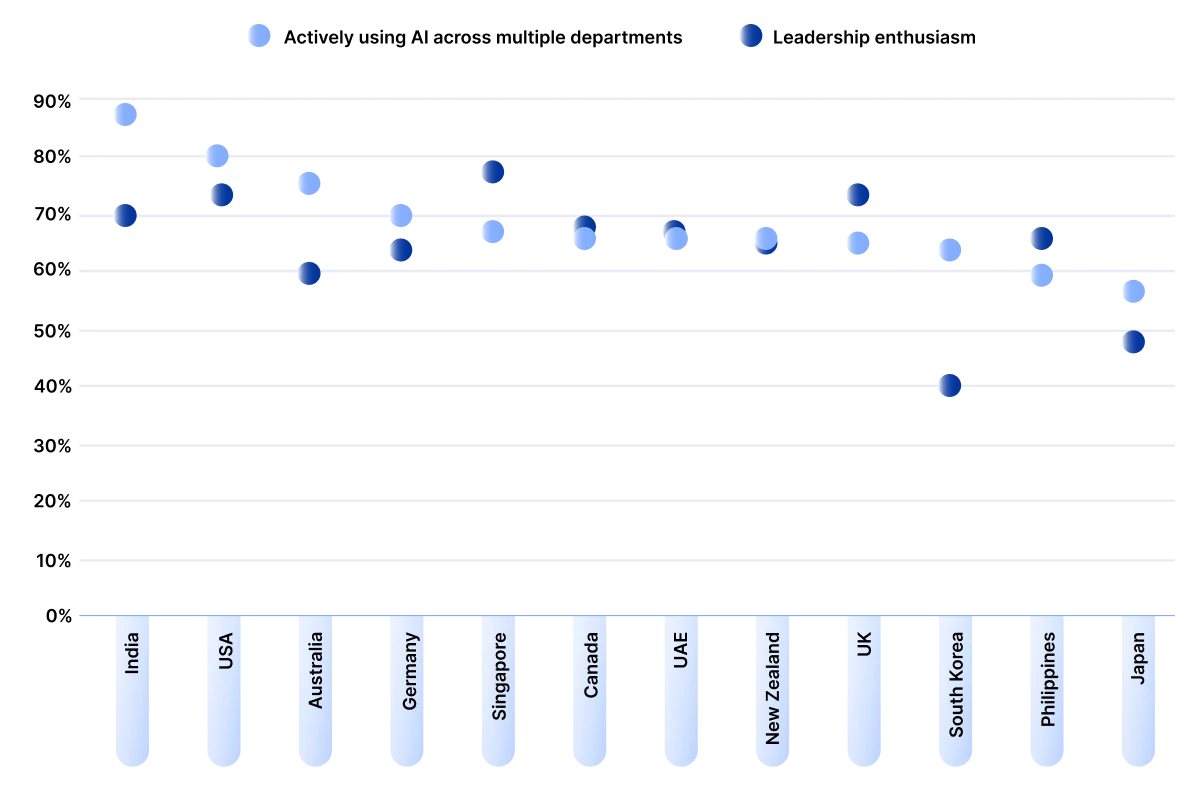
Overall, participants report high levels of usage and enthusiasm for the use of AI in the workplace, with the majority having deployed AI across multiple departments. This broad reach across geographic and departmental lines indicates both the importance and opportunity of incorporating AI in enterprises.
The implications are that companies are looking to rapidly develop AI strategies, invest in training across departments and roles, and adapt their organizational structures to leverage AI effectively to realize value from AI and stay ahead of their competition.
Driving the AI agenda
AI is becoming a core part of enterprise strategy, with a focus on use cases that drive clear operational value. The most common applications include improving employee productivity (e.g., information discovery, content and idea generation, analytics, task automation), business process automation (e.g., compliance, risk management, workflow automation), and customer support and self-service.
While current adoption is fairly balanced—32% in workplace, 34% in process, and 33% in customer service—when asked about importance, organizations ranked process automation highest (44%), followed by workplace use cases (31%), and customer service (24%).
Most important AI use cases

When we look at sector-specific trends, in technology and software, and financial services sectors, the emphasis is on AI-driven insights and analytics, underlining the strategic importance of data as a competitive differentiator. Retail, healthcare, and business services are placing greater focus on AI-enabled customer engagement, while technology and software, financial services, business services, and retail are leading in use cases related to search and information discovery.
Top AI use cases by industry

For leaders shaping their organization’s AI roadmap, the early momentum around automation, support, insights, and productivity offers a clear path forward. However, these initiatives are not instantaneous—most require 7 to 12 months to reach maturity, reinforcing the need for disciplined planning, resource allocation, measurement, and executive oversight.
AI implementation duration

From a technology standpoint, Generative AI, Prompt Engineering, Model Training, LLMs, and Conversational AI are the most advanced in terms of enterprise deployment, with many organizations moving from experimentation to production and scale. These technologies are now seen as reliable enablers for early-stage AI programs. Meanwhile, emerging capabilities such as Multi-Modal AI, and Retrieval-Augmented Generation (RAG), and Agentic AI are gaining momentum, driven by high levels of experimentation and proof-of-concept activity.
Current state of AI technology use

AI readiness
When evaluating readiness to deploy AI at scale, responses suggest that organizations are focused on enablers that directly support execution. Data quality, technology infrastructure, AI talent, and AI applications are viewed as more essential elements of AI readiness compared to the broader strategic factors, such as business alignment, budget planning, and stakeholder buy-in.
Most important areas for AI readiness
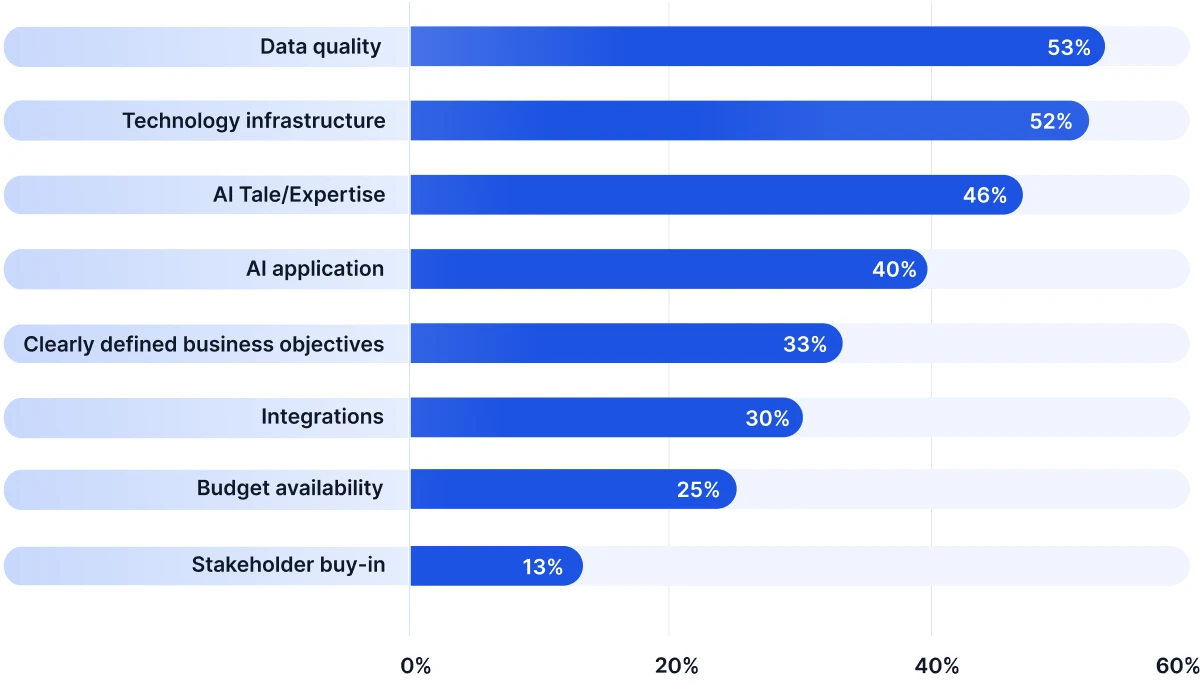
Build or buy- decision fueled by readiness and the road ahead
As AI becomes a critical component of enterprise strategy, organizations are making deliberate choices about how they source and scale their AI solutions or Apps.
Enterprises are leaning toward simplicity over complexity when adopting AI. About one-quarter (25%) favor holistic third-party solutions they can customize, while 31% prefer vendor solutions they can use out-of-the-box. Fewer than 30% pursue fully custom-built AI solutions, and only 16% choose to integrate best-of-breed solutions.

Which best reflects your preferred AI tools? n1029
Hybrid AI Tooling – The one that offers a combination of no-code/pro-code options
Regarding AI development tooling preferences, AI leaders show an inclination towards tooling that offers flexibility and control. Hybrid enterprise AI tools (48%) and open source tools (45%) are favored over pure no-code/low-code tools (7%), indicating a desire to have control and ability to customize for enterprise-specific needs.
Vendor evaluation criteria
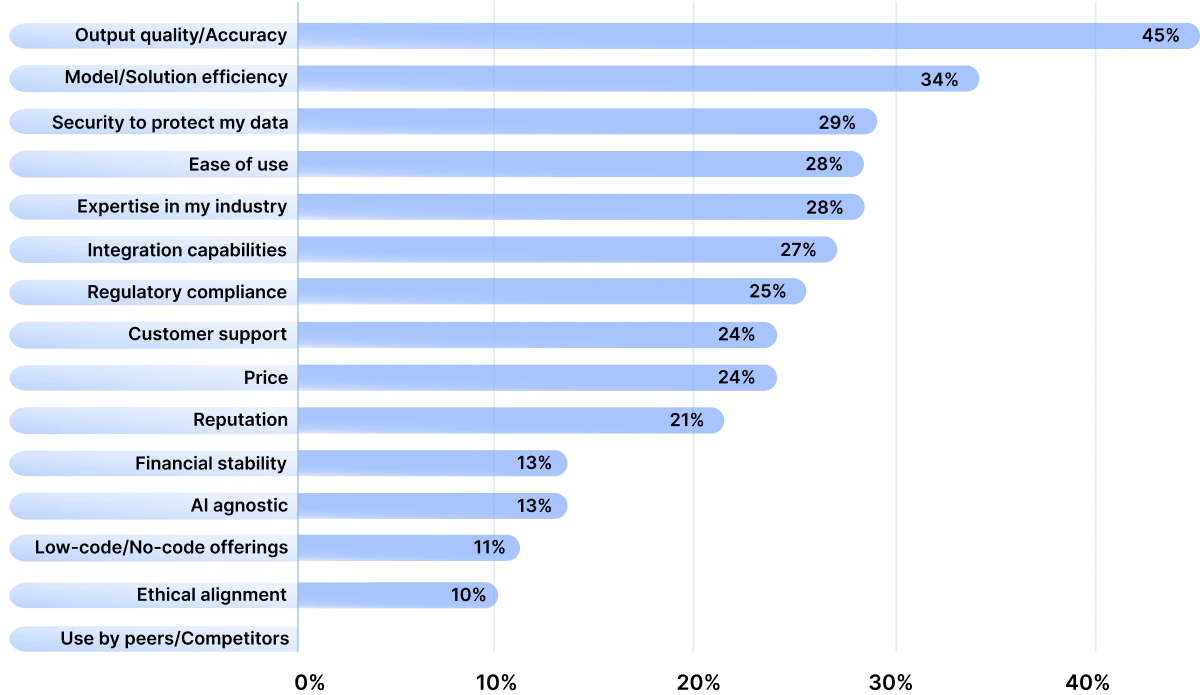
When it comes to AI tech vendor selection, it is shaped by performance and reliability above all. Output quality and accuracy, solution efficiency, data security, ease of use, domain expertise, and integration capabilities are the top decision criteria. Notably, Pricing ranks lower, highlighting the high perceived value of reliable, performant AI.
Across industries, output quality consistently tops the list of priorities, with additional nuances by sector:
- Technology and software firms place greater weight on model efficiency.
- Healthcare organizations prioritize regulatory compliance.
- Business services focus equally on output quality and data protection.
Vendor evaluation criteria

As organizations move beyond experimentation toward real-world deployment, the spotlight is shifting to operational excellence. In this new phase, the choice of AI technology and vendor partnerships could be a strategic imperative.
Top challenges to AI scaling
While 93% of respondents agreed on their pilot project’s success, the most cited barriers for AI scaling are the shortage of AI talent, costs associated with LLMs, data security & compliance, and pressure to prove business value. Safeguarding proprietary, first-party data is essential—not only to meet regulatory and internal governance standards but to build trust in AI outcomes. In response to another question (What type of data is most important for you to use with your AI solutions), 56% of respondents preferred first-party structured or unstructured data over 3rd party data.
The top challenges organizations face when implementing new AI initiatives are talent shortages, cost pressures, data security concerns, and regulatory compliance needs.
While vendor pricing isn’t the primary factor when selecting an AI provider, the ongoing token-based costs associated with LLM usage is rated the second topmost challenge for scaling AI projects.
Organizations’ top AI challenges

When it comes to ROI, the key indicators are operational efficiency, output quality, improvement in employee productivity, customer satisfaction, and time-to-completion. This seems to reflect a focus on efficiency, speed of business, and quality across the organization.
Furthermore, these efficiency-led metrics translate directly into cost reduction, accelerated time to value, and improved ROI, making them the foundation for strategic decisions around continued AI investment.
AI metrics (KPIs) for success

Learnings from AI projects to date
As AI adoption matures across industries, enterprises are taking a closer look at what’s needed to scale beyond pilots and early implementations. Based on lessons learned from initial AI deployments, four critical areas emerge at the forefront: AI talent, Data quality, AI solution security, and tech infrastructure.
Top changes to future AI initiatives

1. Data quality is imperative for AI success
Notably, first-party data (as voted by 56% of respondents) is viewed as the cornerstone of most AI initiatives. Yet, without the right AI tools, processes, and expertise, this valuable asset often remains underutilized. Data science teams will be instrumental in operationalizing this data—ensuring it is clean, contextual, and AI-ready.
Over half of the respondents identify data quality as a top area for improvement. For AI to deliver on its promise—whether in automation, analytics, or personalization—it needs high-quality, well-structured first-party data. In contrast, inconsistent or incomplete data remains one of the biggest obstacles to scaling impact.
Industries like retail, manufacturing, and technology are doubling down on first-party data, recognizing its role in enabling differentiated, AI-driven experiences. Meanwhile, regulated sectors such as healthcare, financial services, government, and business services are placing greater Focus on secure handling of client and third-party data, reflecting their compliance-first priorities over personalization-driven strategies.
First-party data AI usage by industry

2. Security and data privacy are non-negotiable
As AI systems become more deeply integrated into enterprise operations, security has emerged as a critical concern. In fact, 40% of organizations cite solution security and data privacy as top priorities for future AI implementations. This underscores rising worries about data leakage, exposure of proprietary information, and the risks associated with third-party AI tools and models.
AI security, data privacy, and compliance risks vs.

The integration of large language models and third-party AI platforms amplifies the need for clear governance frameworks and trusted AI architectures.
3. Technology infrastructure is a strategic foundation
At the same time, many enterprises are coming to terms with the fact that their existing IT infrastructure isn’t built for AI. To meet the demands of compute-heavy, data-integrated AI workloads, organizations are now actively modernizing their tech stacks. Early adopters understand that infrastructure isn’t just an enabler—it’s a strategic foundation. Without it, AI can’t scale across departments or deliver enterprise-grade value.
4. AI talent is a make-or-break for AI success
While two-thirds of organizations acknowledge a need to strengthen AI expertise, they remain split on how to get there, debating between hiring external talent or upskilling from within. This reflects a larger strategic dilemma: how to scale AI sustainably while preserving control over intellectual property, workflows, and business priorities. Regardless of the path, one thing is clear—AI talent is a crucial factor for AI success.
Navigating the future of AI talent
The evolution of enterprise AI hinges not just on technology, but on the caliber and composition of the talent driving it. Organizations must strategically invest in increasing their internal AI expertise, whether through hiring new employees or upskilling existing ones to address AI-related challenges, including improving data quality, technology infrastructure, and system security.
From the 1,029 respondents, human-AI interaction and data analysis and visualization, and Prompt Engineering emerged as the top-priority skills for the AI-powered future.
Most relevant AI talent skills
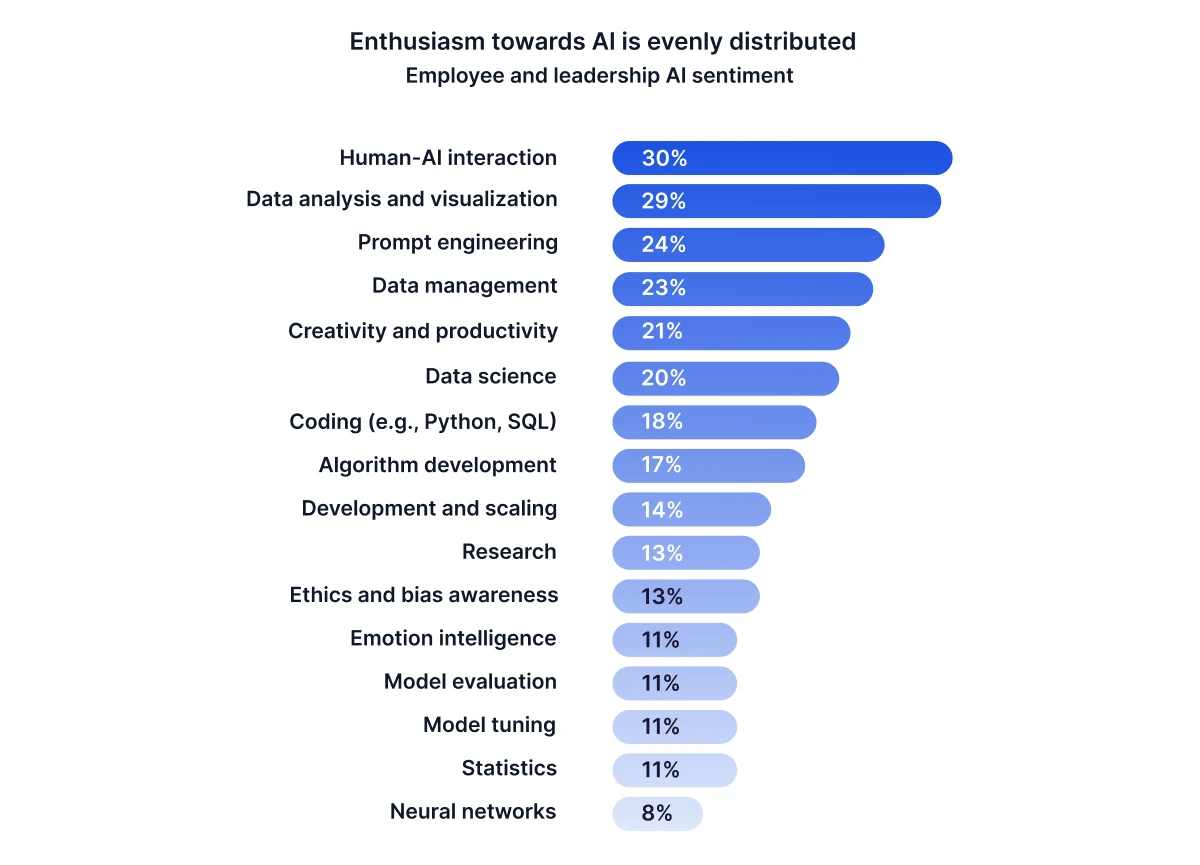
Enthusiasm toward AI is evenly distributed

Notably, both employees and executive leadership express comparable levels of optimism about AI. This can pave the way for a cohesive AI culture across organizational levels.
Given high enthusiasm, increasing internal knowledge and expertise seems a reasonable ask. In the event specific AI expertise cannot be developed in-house, most (90%) are confident in their organization’s ability to both recruit and retain AI talent.
AI talent recruitment and retention satisfaction

AI investment Priorities in 2025 and Beyond
1. AI investments to grow in the next 12 months
9 out of 10 respondents report that they plan to increase their AI investments in 2025, with budgets scaling in both size and ambition.
Future AI budget
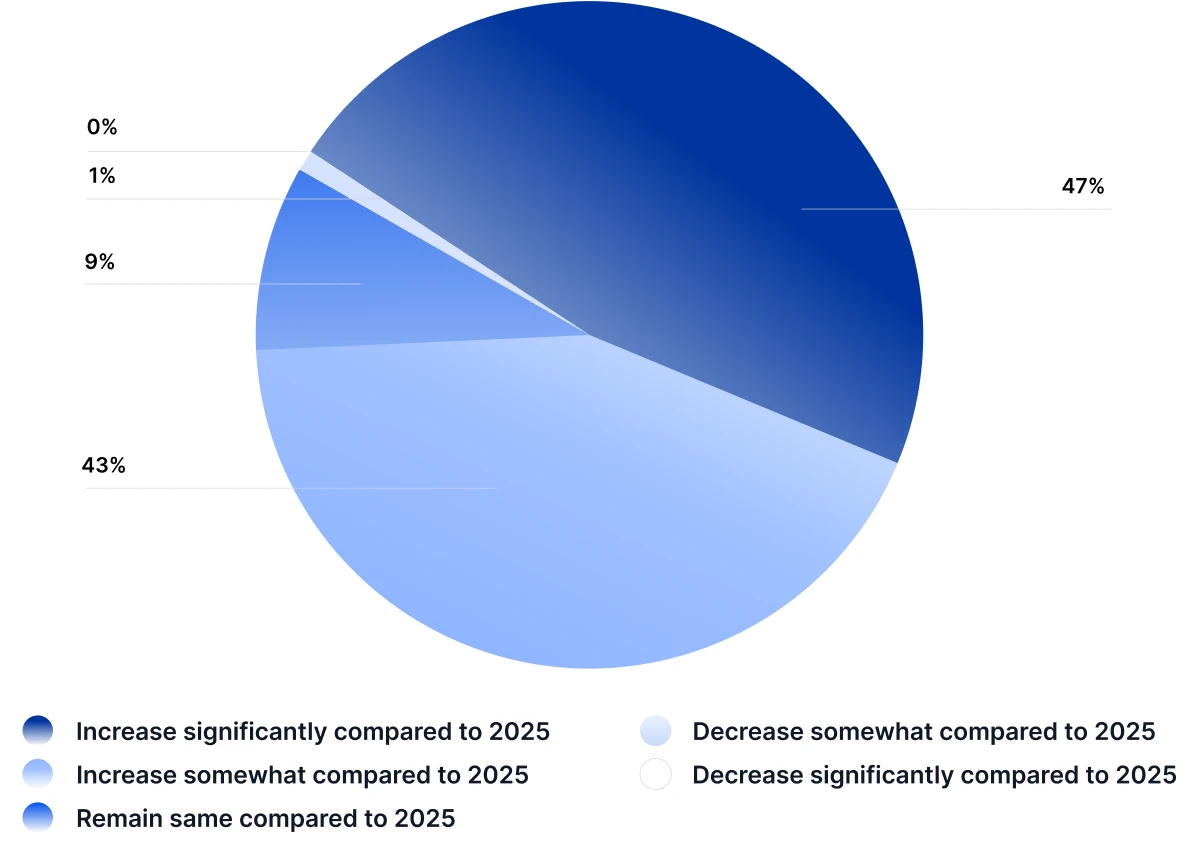
According to the research:
- 90% of enterprises plan to grow their AI budgets over the next three years.
- Three-quarters of organizations are allocating 10-49% of their total tech spend to AI initiatives
- 9% of respondents are dedicating more than half of their IT budgets to AI initiatives.
Percentage of tech budget allocated to AI
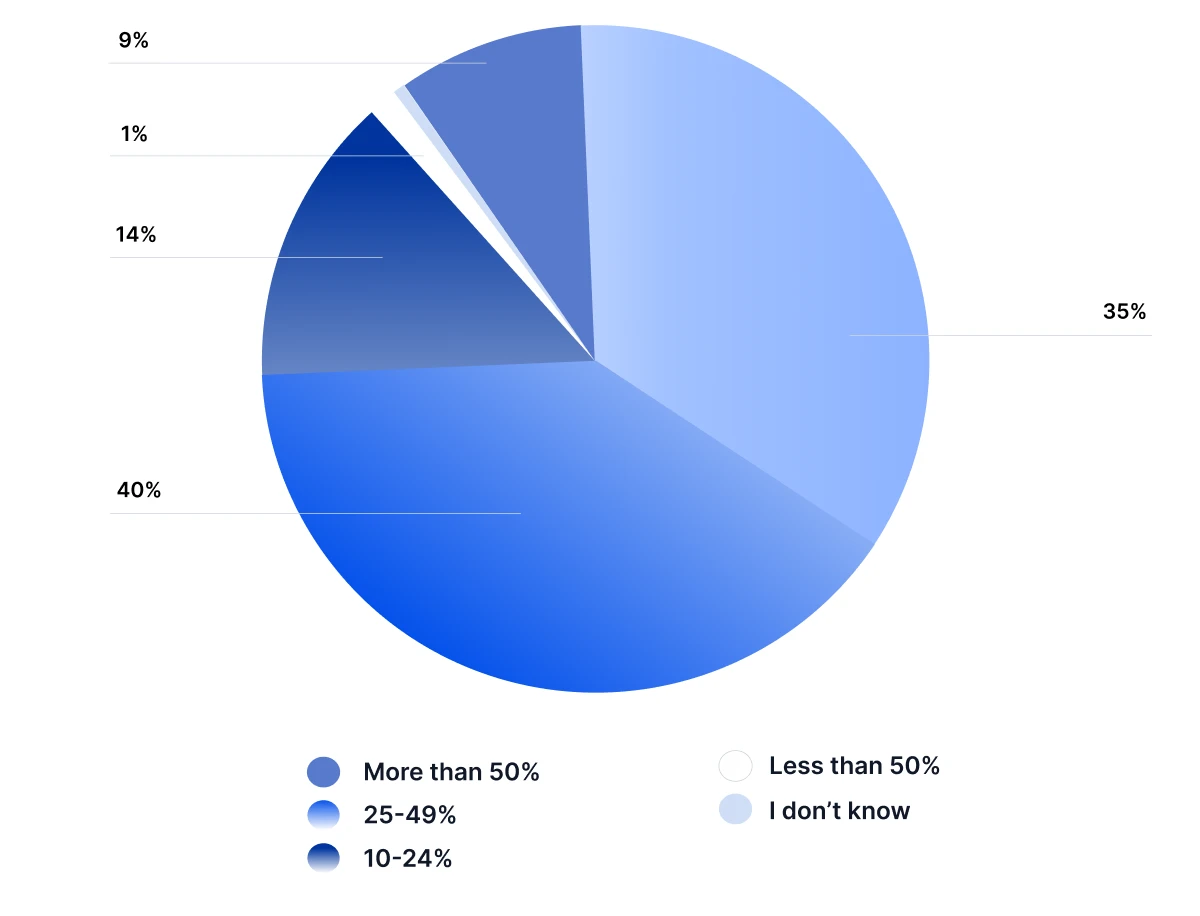
2. Financial services and tech companies to lead the pack
Financial services and tech and software companies show the highest rates of investing over 50% of their tech budget in AI technology, suggesting the high levels of confidence that their investments will pay off. Business services and healthcare are most likely to invest between 20 and 49% in AI. Those in manufacturing seem to be the most conservative when it comes to AI spending, with most investing under 25% of their tech budget in AI.
Percentage of tech budget allocated to AI
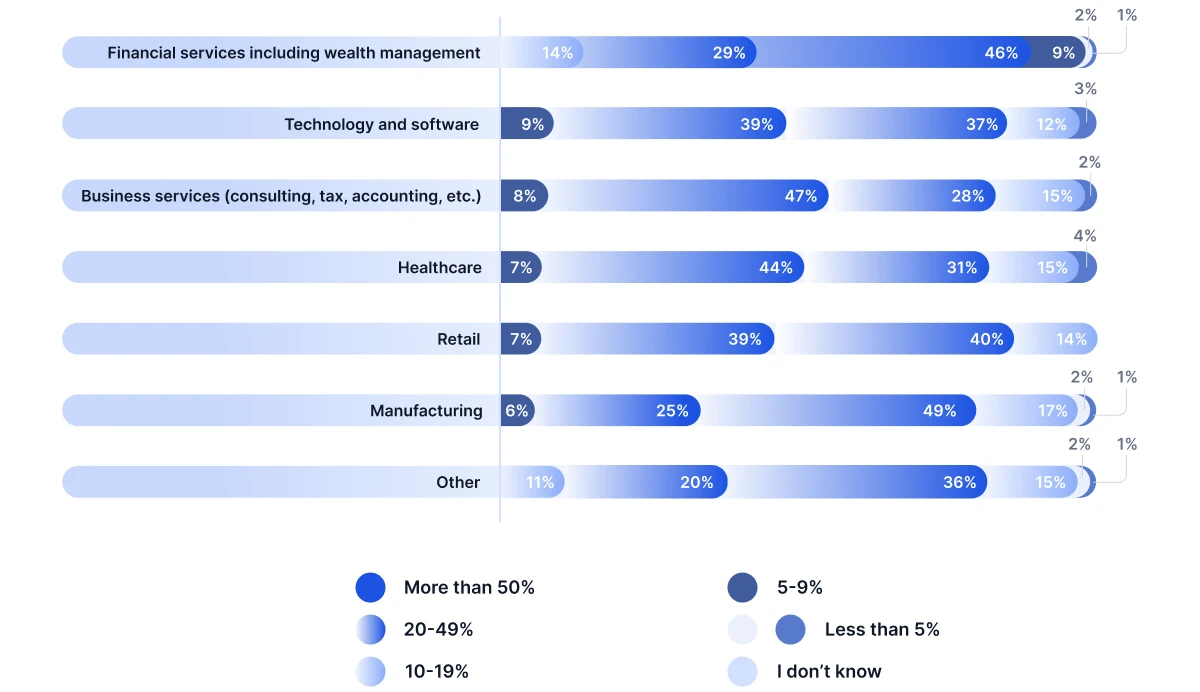
3. Workplace-related use cases to see growing investment
The research shows employee productivity and process automation are set to receive the largest share of AI investment in 2025, prioritizing use cases that promise tangible impact on productivity, efficiency, and insight generation. These are also the areas where organizations expect the highest return on investment over the next two to three years.
Over half of respondents identified work-related AI applications, including productivity solutions and advanced analytics, as their top investment areas. These categories are viewed not only as cost-efficiency levers but as catalysts for unlocking new levels of employee performance and decision-making.
AI Investments use case categories in 2025-26

Anticipated greatest ROI in AI investment
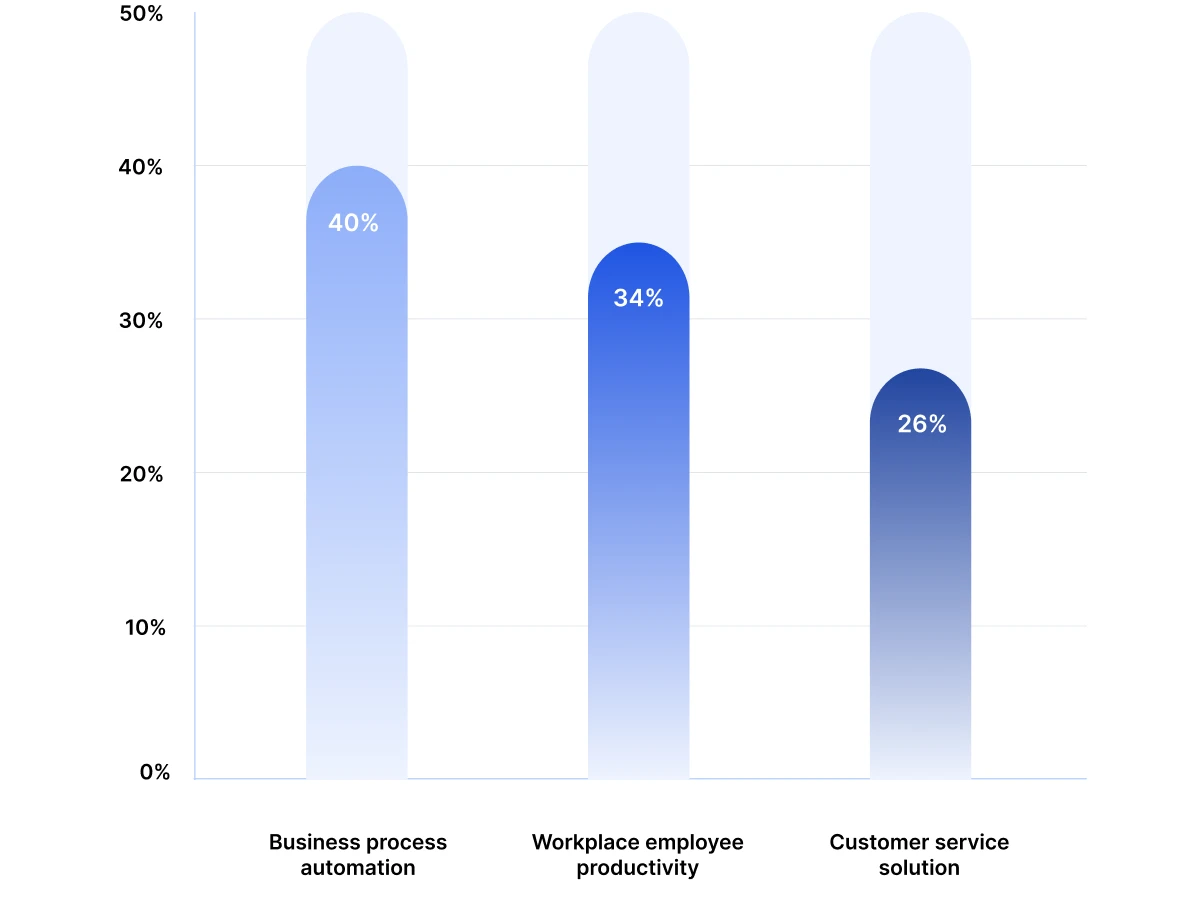
Looking ahead
AI adoption is no longer confined to early use cases or specific industries—it’s rapidly expanding across workplace, process, and customer service functions. As adoption grows, so do the challenges. Organizations are now focused on improving data quality to make first-party data usable by various LLMs, and bridging talent gaps to effectively integrate AI tools with legacy systems. The goal: unlock insights, boost productivity, safeguard customer data, and ensure compliance. Despite these hurdles, most enterprises are doubling down on AI, with increased investments planned, particularly in AI for business process automation and workplace-related use cases and functions.
About the report
Practical Insights from AI Leaders – 2025 represents our research findings on how enterprise AI leaders think about AI, their primary use cases, challenges, success metrics, and planning for future AI. Researched by Paradoxes and supported by Kore.ai, this report offers a global perspective on how leading organizations are operationalizing AI—reshaping business models, accelerating innovation, and creating competitive advantage.
Based on insights from AI leaders across industries and regions, this report focuses on what’s top of mind: the priorities, investments, and talent strategies driving the next phase of AI adoption.
Whether you’re just getting started with AI or planning to scale AI across your organization, this report delivers the practical insights needed to lead with confidence.
Based on insights across industries and regions, this report focuses on what’s top of mind: the priorities, investments, and talent strategies driving the next phase of AI adoption. Whether you’re deploying initial pilots or refining an enterprise-wide AI strategy, this report delivers the intelligence needed to lead with confidence in an era defined by transformation.
Research methodology
Inside the minds of global AI decision-makers: what 1,000+ leaders told us about enterprise AI
In March 2025, Kore.ai partnered with Paradoxes, Inc. to conduct a comprehensive global study on the state of AI in the enterprise, examining top-of-mind questions for scaling with AI, from executive outlooks and real-world use cases to adoption strategies, build vs. buy decisions, and the criteria shaping vendor and technology choices. It also looks ahead, uncovering the emerging challenges, talent gaps, and investment priorities shaping the next wave of AI transformation.
The survey gathered insights from over 1,000 senior business and technology leaders across 12 countries, including the U.S., UK, Germany, UAE, India, Singapore, Philippines, Japan, Korea, Australia, and New Zealand. Participants represented senior executives from large enterprises, each with over 1,000 employees and $250M+ in annual revenue, that were actively exploring or implementing AI initiatives.
About Kore.ai
Kore.ai is a leading provider of agentic AI with over a decade of experience in helping enterprises realize business value. The Company provides strong business solutions leveraging AI for workplace, process automation, and customer service use cases. These are built on a comprehensive agent platform that brings together autonomous agents, sophisticated enterprise knowledge retrieval, intelligent agent orchestration, and no-code/pro-code tools. Kore.ai takes an agnostic approach to AI models, data, cloud infrastructure, and applications, giving customers freedom of choice. Trusted by over 450 Global 2000 companies, Kore.ai is helping the navigation of AI. Visit Kore.ai to learn more.
Kore.ai Business Solutions
Copyright Notice
©2025 Kore.ai. All rights reserved. AI Use Cases: Insights from AI Decision Makers is the exclusive property of Kore.ai.
No part of this publication may be copied, reproduced, stored in a retrieval system, or transmitted in any form or by any means—electronic, mechanical, photocopying, recording, or otherwise—without prior written permission from Kore.ai. This report may not be imported, resold, or redistributed for commercial purposes. Any approved use of data or insights from this publication must be clearly cited as follows: ©2025 Kore.ai, AI Use Cases: Insights from AI Decision Makers.
The insights and data provided in this report are for informational purposes only. While the findings are based on rigorous research and expert analysis, they may reflect interpretations and perspectives that do not necessarily represent the official position of Kore.ai.
Although every effort has been made to ensure the accuracy and reliability of the information contained herein, Kore.ai accepts no liability for errors, omissions, or any loss or damages arising from the use of this content. Readers are advised to use discretion when applying these insights to their own organizational contexts.

Scaling AI: practical insights from AI leaders
A proprietary Kore.ai report capturing the beliefs, sentiments, and priorities of today’s enterprise AI decision-makers
Access Report








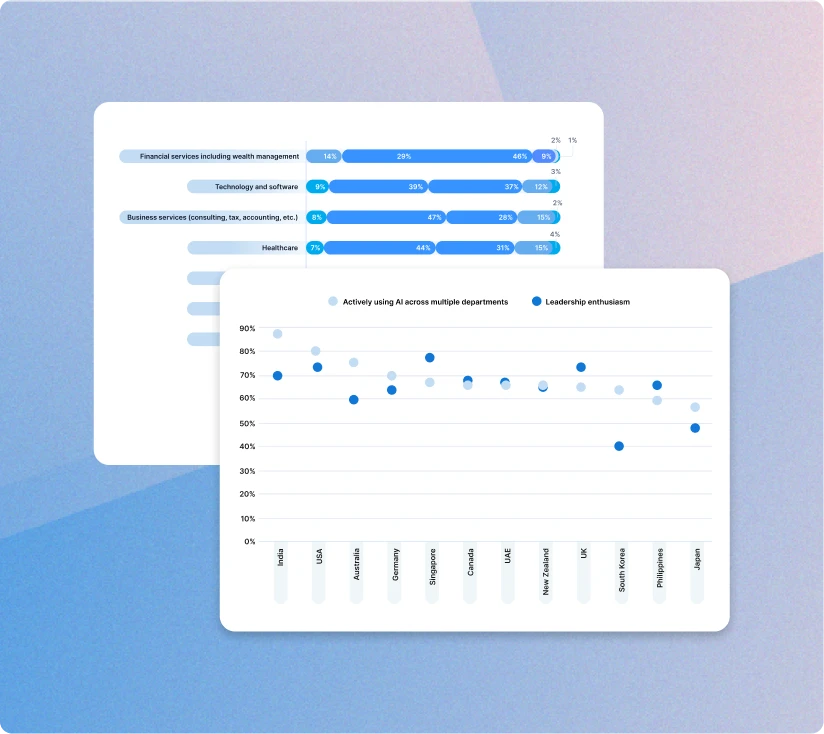





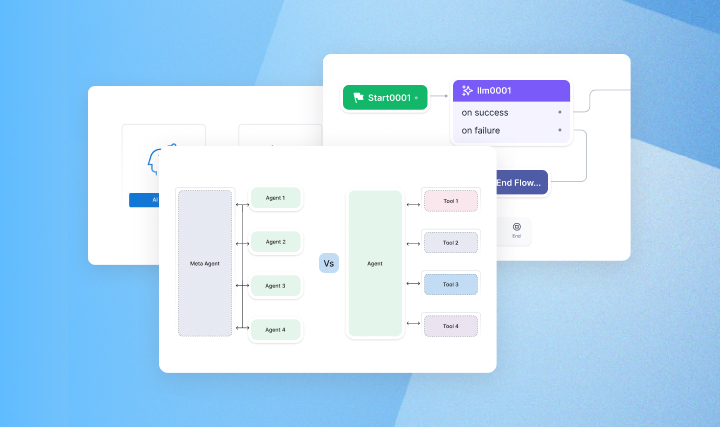

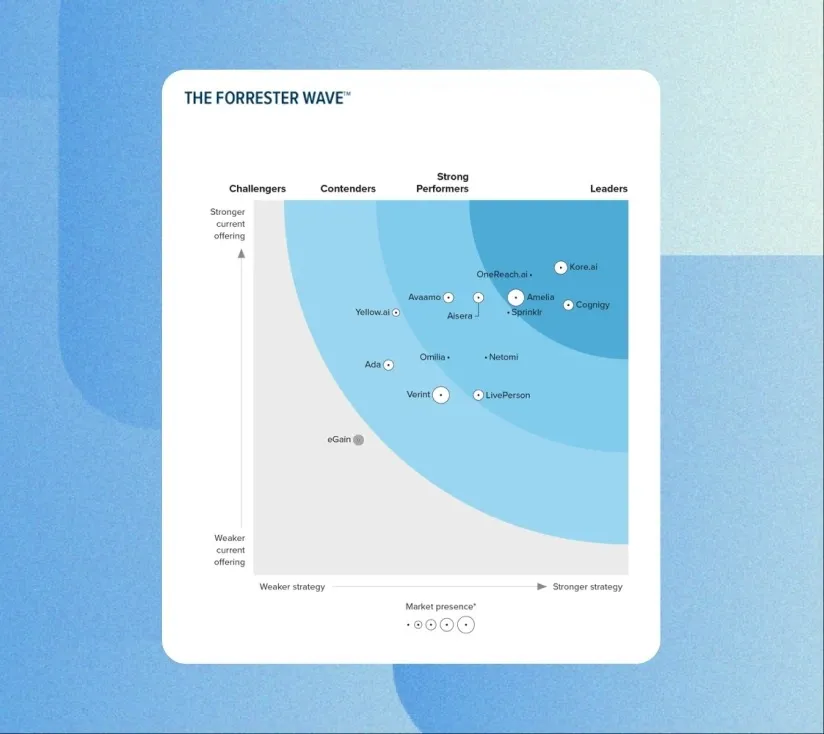


.webp)